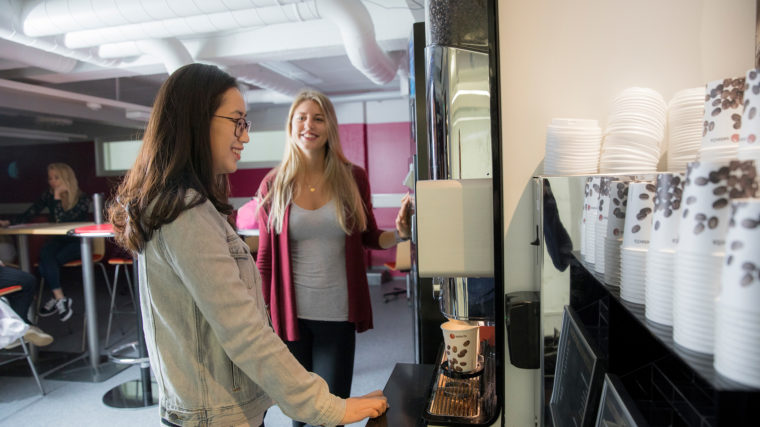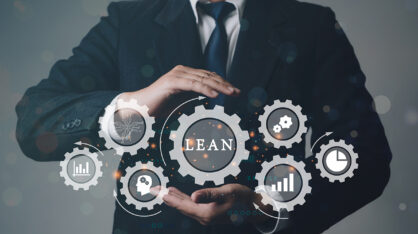Quality System Supports the Implementation of the Strategy
Focus on competence and its continuous enhancement
Our vision, mission and values highlight competence and its continuous enhancement. This applies to the competence of our students, cooperation partners as well as of our staff and enhancement of VAMK as an organisation.
The quality system with its process descriptions, quality management procedures, annual planning cycles, indicators and feedback systems are tools for the Management and leadership to achieve our goals and enhance our competence. The five enhancement areas in VAMK’s strategy are:
- Deepening the cooperation with working life, aiming to a new kind of partnership between the HEI and working life.
- Increasing the volume of RDI and service activities and the level of competence, the goal is stronger RDI and services activities as part of national and international network.
- International working and study environment. The goals is that our students have international experience and competence that export-oriented working life in the region requires.
- The success of the students. The goal is the student satisfaction and timely graduation.
- Enhancing the well-being of the staff by inclusion, increasing community-spirit and by good HR management. A competent staff that is doing well achieve better results and enjoy their work.
Plan-do-check-act in quality system
The entire quality management is described in our quality handbook. Our quality system is based on Deming’s Plan-Do-Check-Act –cycle on quality management, in which measures are planned, implemented, checked and assessed, applied in practice, necessary changes are made and learning takes place continuously. Annual planning cycles have been drawn up for the Board and the Management Team and they show the most important tasks in a schedule. To be able to assess if we are going to the right direction, the Board and the Management Team follow up the indicators quarterly. The foundation for everything are the strengths that we have defined, in which we can also become better – and more
competitive. Essentially, the quality system produces the information that everyone needs in his/her work. The new Peppi system, among other things, will provide a possibility to use information in a more efficient way, for example for tutor teachers about the progress of the studies in the group.
Enhancing the Competence and Well-being of Staff
We will invest in enhancement of competence
Deepening the cooperation with working life and increasing the volume of RDI and service activities and level of competence encourage and obligate us to enhance our competencies and simultaneously give us possibilities to find new ways to acquire competence. Enhancing the competence means that we need to recognise the competence we have now and what sort of competence we must increase to be able to operate in the areas of emphasis we have defined. This recognition is done in appraisal discussions with supervisors. The estimate of the competencies and needs of the staff received from the discussions have been collected onto Intra in HR plan and aims for staff training document. The new HR system to be introduced next year will facilitate this work when the summaries of needs arisen in the appraisal discussions are received automatically. In addition to participating in staff training, competence can be enhanced in projects, cooperation networks and by benchlearning. Service activities and training provided to enterprises separately may be exacting to implement but they also strengthen the competencies of the staff. An excellent way to enhance substance skills and to network is to agree of a working life period with an employer in your expertise area.
Well-being of staff a strategic enhancement area
Enhancing the well-being of the staff has been chosen as one out of five strategic enhancement areas at VAMK because retrenchments during the recent years especially have stressed the well-being and coping at work. The well-being of the staff is followed up in the Työvire survey, the results of which have been discussed in each team separately. The discussions have opened up some problem areas and have given background for the enhancement activities.
The Equality and Non-Discrimination Plan gives the principles for fair treatment of the staff.
Towards Inclusive Quality Culture
The community spirit is built on shared values, by promotion of which we can create a basis for mutual trust and goals. Dialogue, interaction and working together are important and these are implemented in our everyday tasks, meeting practices and development projects. In the strategy process, we wanted that everyone – students, staff and working life representatives alike – have a possibility to influence in the strategy as the Board and the Management Team were working on it. Now we are in the phase in which the strategy is implemented through action plans and thus has an impact on everyone’s work at VAMK.
A good and long-lasting cooperation with Vamok is based on trust and mutual appreciation, a real desire to hear and to listen, learn together how to enhance both the learning and teaching process. With our most important working life partners, annually arranged cooperation meetings have turned put a good practice. A large group of teachers from the units and degree programmes participate in the meetings. This year the meetings were held online and enabled an even larger group of participants from us and from partners.




